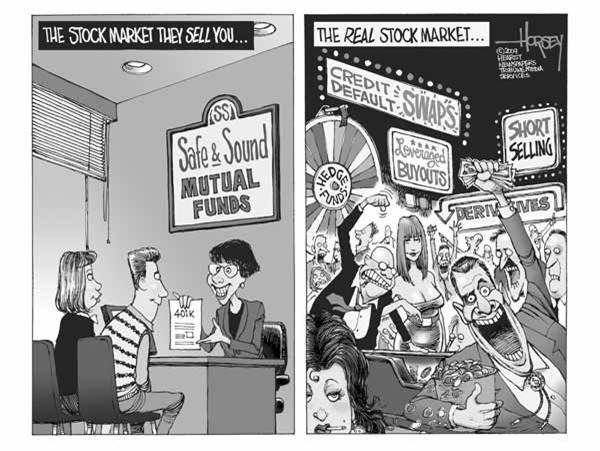
After the huge arguments between London and Brussels over bankers’ bonus levels, where the UK has argued Europe is encouraging our bankers to leave and go to Geneva, New York and Hong Kong, we have now responded by introducing levels of punishment for financial wrongdoing that far outstrips those in Geneva, New York and Hong Kong.
The measures from the Bank of England announced today say that bankers found to be taking unacceptable risks in the future, will have up to seven years exposure to clawbacks.
Those unacceptable risks and behaviours would include actions such as the LIBOR and FX market fixing, the challenges of Gold and Silver market rigging, SWAPS mis-selling and more.
Equally, it would include the issue that I think is at the heart of all of this: casino capitalism.

Cartoon by David Horsey at the Los Angeles Times
That phrase arose after the implosion of markets in 2008.
That implosion was caused by the incorrect analysis of risk related to credit default swaps.
We have addressed those issues to some extent: too big to fail, living wills, end of prop trading, separating retail and wholesale banking, new governance structures, new requirements to gain a bank licence, etc, etc.
However, the big heart of casino culture was the attitude of the bankers themselves.
Taking unacceptable risks, pushing everyone to invest faster and more speculatively, gearing all to getting the bigger bonus. All of that was the issue at the heart of the financial markets explosion and subsequent implosion.
Culture.
It was typified by Cityboy, David Charters and Michael Lewis.
Cityboy, aka Geraint Anderson, described a testosterone fuelled alpha male inhabited jungle where you get rich, get eaten or get out.
David Charters talks about “at bonus time, no-one can hear you scream”, where the annual bonus day becomes the focal point of the investment banker’s life.
Michael Lewis in Liar’s Poker talks about a Wall Street culture where traders would yell at and insult financial experts who talked to them, throw spit balls at each other, call phone sex lines and broadcast them over the company's intercom, gamble on how long it would take trainees to fall asleep during lectures, and an incredible lust for money and contempt for any position that did not earn much.
Where did this bonus issue come from?
It came from Wall Street in the 1990s as private firms like Goldman, Bear Stearns and Lehman, were run by partners.
The partners would invest capital in the firm and reap large rewards during good years, of which there were many.
As a result, they were investing their own funds in the firm, and hence risk was managed by behaving as though you were investing, or gambling if you prefer to think of this as a casino, with your own money.
Once these firms went public and moved to shareholder owned investment banks, the troubles began.
The formerly private firms that gave major bonuses to partners gambling their own capital now gave major bonuses to employees gambling shareholder and client capital.
That is the core issue of the bonus culture.
Investing, or gambling, without accountability.

Cartoon by Mike Thompson at the Detroit Free Press
That is why the bonus cap is not the answer.
The bonus cap introduced by the EU purely increased investment bankers’ salaries, as bonuses are limited to one year’s salary.
In other words, you’re still gambling without accountability, but your salary is now guaranteeing that you start doing that in comfort.
According to Forbes, the average salary of investment banker varies as follows:
- Summer interns/associate: $71,300 (+$9,400)
- First year analyst: $85,300 (+$28,700)
- Third year analyst: $111,400 (+$51,600)
- First year associate: $120,000 (+$39,900)
- Third year associate: $149,000 ($60,700)
- Vice President: $255,700 (+$116,800)
- Managing Director: $273,400 (+$135,600)
Whilst, accofrding to the recruitment firm Michael Page, the average salaries in London for front office roles are £200,000 a year for a Head of Department or SVP (plus 100%-300% bonuses), £120,000 for a senior manager or VP (plus 50%-150% bonus) and £80,000 for a manager or AVP (plus 30%-100% bonus.
So here’s what the Bank of England are getting at: how do you discourage reckless investing? How do you stop investment bank traders becoming excessive risk takers without accountability?
That’s what this new rule is getting at: that bankers cannot take excessive risk without accountability.
The rule actually works this way: most bank bonus payments are now made in deferred share options that require the employee to stay with the bank for three years to claim this.
Upon claiming their bonus, the bank can take it back if the individual is found to be involved in any wrong-doing for up to three years after this.
In total therefore, you can be awarded a bonus in 2015 and potentially have to return that bonus for any time between then and 2022 if you are found to have been involved in any form of misconduct or false risk.
That’s good if you ask me, and some agree:
“I would say that in principle, I support the idea that where there is wrongdoing, there should be appropriate punishment”, says Antony Jenkins, Chief Executive of Barclays. “If that's criminal wrongdoing, it should be criminal, if it's recklessness, that should be punished also, so I'm not against the concept of clawback.”
Others believe that it will be too difficult to enforce as the investment banker whose bonus is taken back in 2021 for 2015 activities could say it was the culture, the management team, the markets or other circumstances that caused the issue.
That reminds me of when Enron went bust and, half a year later, was swimming in billions of dollars of futures derivatives contracts that came good.
There’s black and white and grey here, as in all things, but the overall move of the Bank is likely to be one copied by many if you ask me.
After all, taking risks with accountability is far better than taking risks with no retribution.
Chris M Skinner
Chris Skinner is best known as an independent commentator on the financial markets through his blog, TheFinanser.com, as author of the bestselling book Digital Bank, and Chair of the European networking forum the Financial Services Club. He has been voted one of the most influential people in banking by The Financial Brand (as well as one of the best blogs), a FinTech Titan (Next Bank), one of the Fintech Leaders you need to follow (City AM, Deluxe and Jax Finance), as well as one of the Top 40 most influential people in financial technology by the Wall Street Journal's Financial News. To learn more click here...

